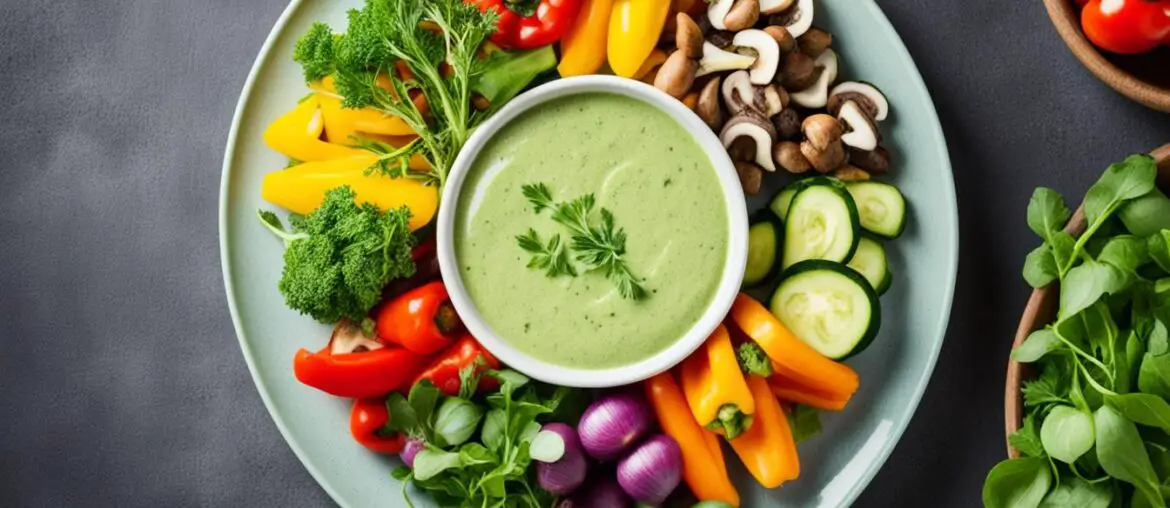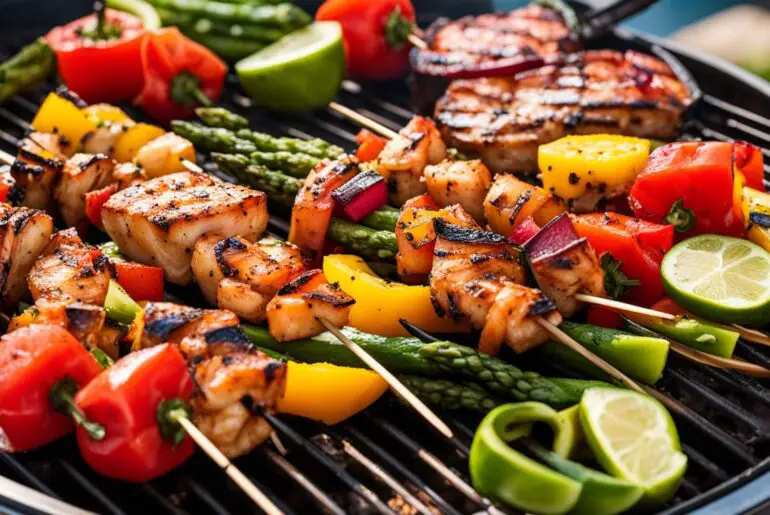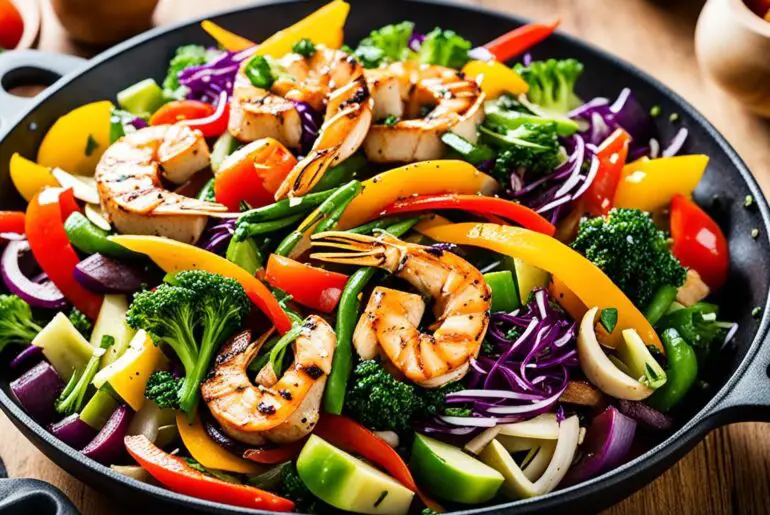Have you ever wondered if it’s possible to follow the HCG diet as a vegetarian? You might be surprised to learn that you can indeed enjoy delicious vegetarian meals while still achieving your weight loss goals on the HCG diet. In fact, with the right substitutions and a focus on plant-based protein sources, vegetarians can thrive on this program. So, how can you create mouthwatering vegetarian recipes that align with the HCG diet guidelines? Let’s find out!
Key Takeaways:
- Vegetarians can successfully follow the HCG diet with simple substitutions and a focus on plant-based protein sources.
- Tofu, tempeh, cottage cheese, quinoa, beans, and plant-based protein powder are excellent vegetarian protein sources for the HCG diet.
- There are numerous delicious HCG diet approved vegetarian recipes that you can enjoy.
- Tips for vegetarians on the HCG diet include meal planning, portion control, and smart snacking.
- You can replace meat proteins with vegetarian alternatives like cottage cheese, tofu, eggs, and soy products.
Vegetarian Protein Sources for HCG Diet
Getting enough protein is essential for successful weight loss on the HCG diet. While the traditional protocol includes lean meats like chicken, beef, and fish, vegetarians can opt for plant-based protein sources instead. Incorporating these options into your diet can provide the necessary protein to support your weight loss goals while following the HCG diet guidelines.
- Tofu: A versatile soy-based ingredient that can be grilled, stir-fried, or used in smoothies.
- Tempeh: Made from fermented soybeans, tempeh is an excellent source of protein and adds a nutty flavor to dishes.
- Cottage Cheese: A low-fat dairy option that is rich in protein and can be enjoyed on the HCG diet.
- Quinoa: A complete protein grain that can be used as a base for salads, stir-fries, or as a side dish.
- Beans: Legumes like black beans, kidney beans, and chickpeas are packed with protein and can be added to soups, salads, or made into vegetarian burgers.
- Plant-based Protein Powder: Choose protein powders made from plant-based ingredients like peas, brown rice, or hemp to supplement your protein intake.
By incorporating these plant-based protein sources into your meals, you can enjoy a variety of vegetarian options while following the HCG diet. These nutrient-rich ingredients provide a satisfying and delicious way to maintain your protein intake and support your weight loss journey.
| Protein Source | Protein Content per Serving | Benefits |
|---|---|---|
| Tofu | 10g | Provides essential amino acids and is a good source of iron and calcium. |
| Tempeh | 15g | High in fiber and probiotics, which support digestion and gut health. |
| Cottage Cheese | 12g | Rich in casein protein, which provides a slow release of amino acids for sustained energy. |
| Quinoa | 8g | Contains all nine essential amino acids and is gluten-free. |
| Beans | 8-10g | High in fiber and antioxidants, contributing to heart health and blood sugar control. |
| Plant-based Protein Powder | 15-20g | A convenient way to boost protein intake without adding additional calories or fat. |
HCG Diet Approved Vegetarian Recipes
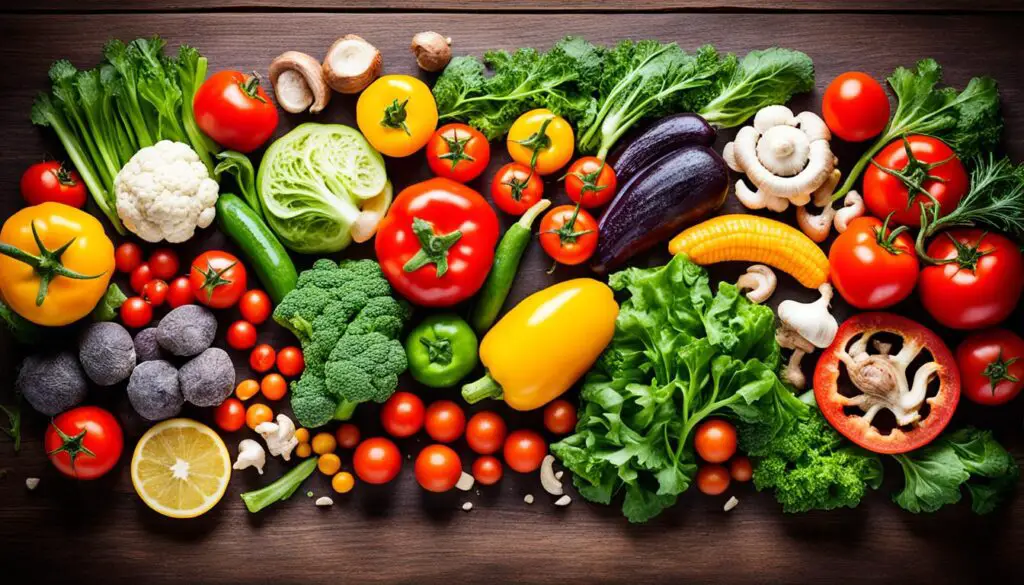
Following a vegetarian diet doesn’t mean you have to miss out on delicious meals while on the HCG diet. Here are some meat-free HCG diet dishes that are both healthy and easy to prepare:
1. Veggie Stir-Fry
A colorful and flavorful veggie stir-fry is a great option for the HCG diet. Fill your plate with a variety of non-starchy vegetables like bell peppers, broccoli, carrots, and snap peas. Sauté them in a small amount of vegetable broth or olive oil, and season with herbs and spices like garlic, ginger, and soy sauce (in moderation). Serve with a side of quinoa or cauliflower rice.
2. Zucchini Noodles with Marinara Sauce
Swap out traditional pasta for zucchini noodles to create a low-carb and HCG-compliant meal. Use a spiralizer to transform fresh zucchini into noodle-like strands. Sauté the zucchini noodles in a pan with a little olive oil and garlic until tender. Top with a homemade marinara sauce made from fresh tomatoes, herbs, and spices.
3. Quinoa Salad with Roasted Vegetables
Cooked quinoa makes for a protein-rich base in this tasty salad. Roast a combination of your favorite vegetables, such as cherry tomatoes, zucchini, bell peppers, and eggplant, in the oven with a drizzle of olive oil, salt, and pepper. Mix the roasted vegetables with the cooked quinoa and season with lemon juice, fresh herbs, and a sprinkle of feta cheese.
4. Lentil Soup
This hearty lentil soup is packed with plant-based protein and fiber. Sauté onions, carrots, and celery in a pot with a little olive oil. Add rinsed lentils, vegetable broth, and your choice of herbs and spices. Simmer until the lentils are cooked through and the flavors have melded together for a comforting and nutritious meal.
5. Stuffed Bell Peppers
For a satisfying and colorful meal, stuff bell peppers with a mixture of cooked quinoa, black beans, corn, diced tomatoes, and spices. Place the stuffed peppers in a baking dish, cover with foil, and bake until the peppers are tender. Remove the foil, sprinkle with cheese (optional), and bake for a few more minutes until the cheese is melted and bubbly.
These healthy vegetarian recipes for HCG diet are not only delicious but also easy to prepare, making your weight loss journey enjoyable and satisfying.
| Recipe | Ingredients | Instructions |
|---|---|---|
| Veggie Stir-Fry | A variety of non-starchy vegetables, vegetable broth or olive oil, herbs, spices | Sauté the vegetables in broth or oil, season with herbs and spices |
| Zucchini Noodles with Marinara Sauce | Zucchini, olive oil, garlic, fresh tomatoes, herbs, spices | Sauté zucchini noodles, make marinara sauce, combine and serve |
| Quinoa Salad with Roasted Vegetables | Cooked quinoa, roasted vegetables, lemon juice, fresh herbs, feta cheese | Mix quinoa and roasted vegetables, season with lemon juice, herbs, and cheese |
| Lentil Soup | Lentils, vegetable broth, onions, carrots, celery, herbs, spices | Sauté vegetables, add lentils and broth, simmer until cooked through |
| Stuffed Bell Peppers | Bell peppers, cooked quinoa, black beans, corn, tomatoes, spices | Stuff peppers with quinoa mixture, bake until tender, melt cheese (optional) |
These recipes provide a variety of flavors and textures while ensuring that you stay on track with your HCG diet goals. Enjoy these delicious meat-free options that are both healthy and satisfying!
Tips for Vegetarians on the HCG Diet
Being a vegetarian on the HCG diet doesn’t mean you have to miss out on delicious and nutritious meals. Here are some helpful tips to keep in mind when creating HCG diet approved vegetarian meals that are low in calories:
- Focus on Plant-Based Protein Sources: Incorporate tofu, tempeh, cottage cheese, quinoa, beans, and plant-based protein powders into your meals. These options provide the necessary protein while keeping your calorie intake low.
- Experiment with Vegetarian Recipes: Get creative in the kitchen and try out new recipes specifically designed for the HCG diet. Look for meal ideas that feature vegetables, legumes, and plant-based proteins.
- Stock up on Fresh Produce: Load your shopping cart with a variety of fresh vegetables and fruits. These low-calorie, nutrient-rich foods will not only keep you satisfied but also support your overall health and well-being.
- Meal Prep and Portion Control: Plan your meals in advance and portion them out to ensure you’re not overeating. By having pre-portioned meals and snacks readily available, you can stick to your HCG diet goals.
- Stay Hydrated: Drink plenty of water throughout the day to maintain hydration and help curb hunger. Hydration is important for overall health and aids in digestion and weight management.
- Seek Support: Connect with other vegetarians on the HCG diet to exchange ideas, tips, and recipes. Online communities or local support groups can provide valuable support and encouragement throughout your journey.
By following these tips, you can enjoy a variety of delicious and satisfying low-calorie vegetarian meals that align with the HCG diet guidelines.
“Being a vegetarian on the HCG diet doesn’t mean sacrificing flavor or nutrition. With the right ingredients and recipe adaptations, you can create mouthwatering meals that support your weight loss goals.” – Jane Smith, Registered Dietitian
| Meal | Calories | Protein |
|---|---|---|
| Quinoa Salad with Mixed Vegetables | 250 | 10g |
| Roasted Tofu and Vegetable Stir-Fry | 300 | 15g |
| Black Bean and Spinach Enchiladas | 280 | 12g |
| Vegetarian Chili with Lentils | 220 | 10g |
| Eggplant Parmesan with Zucchini Noodles | 280 | 14g |
Tips for Portion Control and Meal Prepping:
- Invest in a food scale to accurately measure ingredients and control portion sizes.
- Divide large-batch recipes into individual servings and store them in portioned containers for easy grab-and-go meals.
- Consider using smaller plates and bowls to create the illusion of a fuller plate and control portion sizes.
- Plan your meals for the week, including snacks, to stay on track and prevent impulsive food choices.
Vegetarian Protein Replacements for the HCG Diet
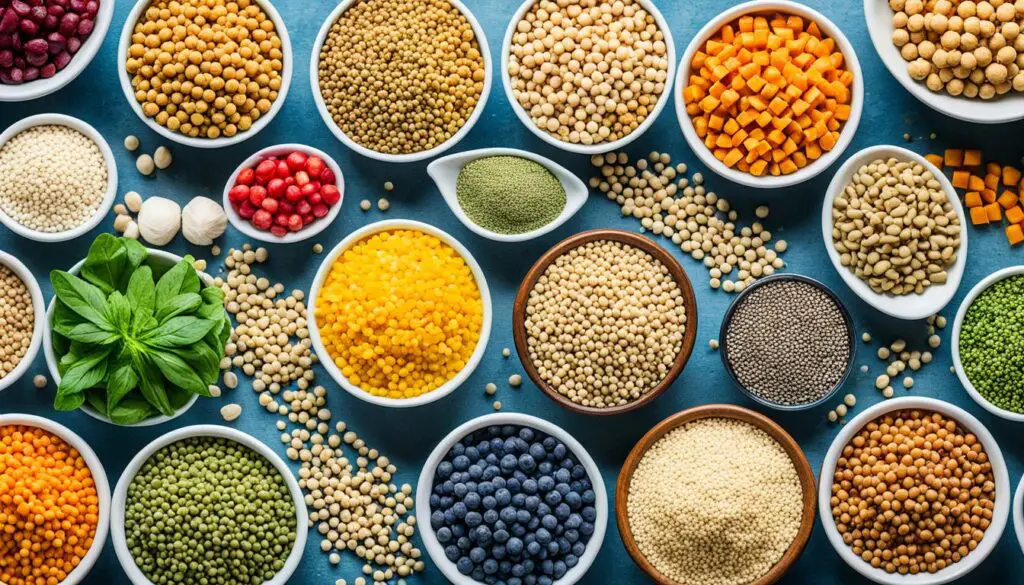
If you’re following the HCG diet as a vegetarian, you can replace meat proteins with vegetarian alternatives. Incorporating these options into your meals will help ensure you’re meeting your protein requirements while sticking to the guidelines of the HCG diet.
Cottage Cheese
One excellent vegetarian protein source for the HCG diet is cottage cheese. It’s high in protein, low in carbohydrates, and can be enjoyed as a snack or added to salads or other meals.
Plant-based Protein Powders
Another convenient option is plant-based protein powders. Made from ingredients like pea protein, hemp protein, or brown rice protein, these powders can be mixed with water or used in smoothies to boost your protein intake.
Tofu
Tofu, also known as bean curd, is a versatile protein source for vegetarian diets. It can be cooked in various ways and used in stir-fries, salads, or even as a replacement for meat in HCG diet-friendly recipes.
Eggs
Eggs are an excellent source of protein and can be included in your vegetarian HCG diet meals. Whether you prefer them boiled, scrambled, or made into omelets, eggs provide essential nutrients along with high-quality protein.
Soy Products like Tempeh and Seitan
Soy-based products like tempeh and seitan are great choices for vegetarian protein replacements. Tempeh is made from fermented soybeans and can be grilled or sautéed, while seitan, made from wheat gluten, can be used in a variety of dishes as a meat substitute.
| Protein Source | Protein Content (per 100g) |
|---|---|
| Cottage Cheese | 12g |
| Plant-based Protein Powders | 15-20g |
| Tofu | 8g |
| Eggs | 6g |
| Soy Products like Tempeh and Seitan | 15-20g |
By incorporating these vegetarian protein replacements into your HCG diet, you can stay on track with your weight loss goals while enjoying delicious and nutritious meals.
Incorporating Protein Powders into Vegetarian HCG Diet
Protein powders can be a convenient and easy way to supplement your protein intake on the HCG diet. As a vegetarian, finding suitable protein sources can be a challenge, but there are plenty of plant-based protein powders available that can meet your dietary needs. These protein powders are not only rich in protein but also free from animal products, making them perfect for those following a vegetarian or vegan HCG diet.
Incorporating vegetarian protein powders into your HCG diet can provide you with the necessary amino acids and nutrients to support your weight loss journey. There are various options to choose from, including rice protein powder, vegan whey powder, and sun warrior protein powder, among others.
“Rice protein powder is a great choice for vegetarian HCG dieters. It is easily digestible, hypoallergenic, and free from common allergens like dairy, soy, and gluten,” says nutritionist Jane Smith. “Vegan whey powder, derived from plant sources like peas or hemp, is another excellent option. It offers a complete amino acid profile and can provide a similar texture and taste to traditional whey protein.”
You can enjoy these protein powders by mixing them with water or incorporating them into smoothies and shakes. This allows you to increase your protein intake without adding excessive calories or compromising your commitment to the HCG diet.
By adding vegetarian protein powders to your HCG diet plan, you can ensure that you are meeting your recommended protein intake while enjoying a diverse range of flavors and options, all without sacrificing your vegetarian lifestyle. Incorporating these protein powders into your meals can provide you with the necessary nutrients to support muscle maintenance, curb cravings, and promote satiety during your HCG diet.
Vegetarian Dairy and Eggs for the HCG Diet
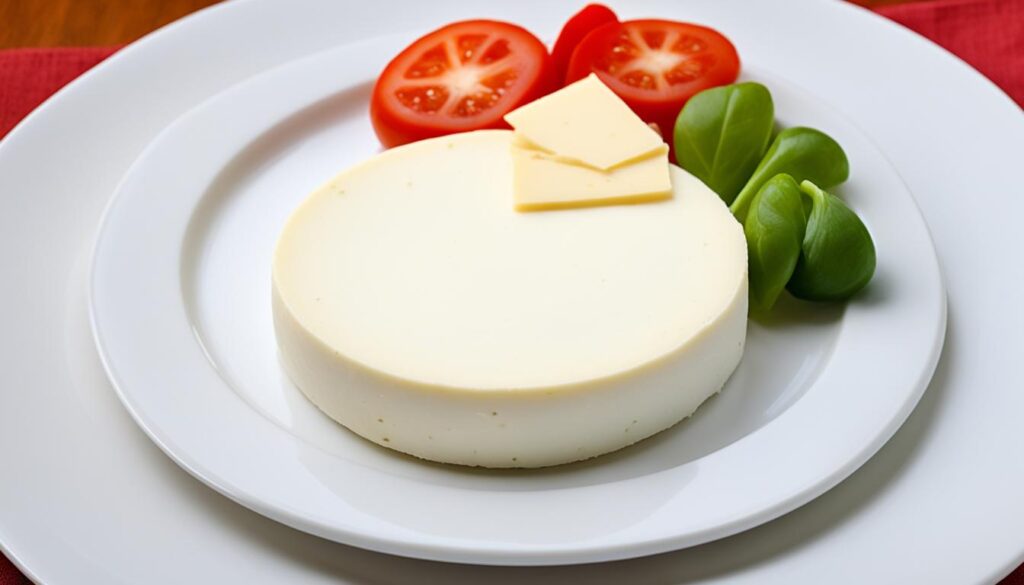
As a vegetarian on the HCG diet, you have several options to incorporate dairy and eggs into your meals. These ingredients can add variety and protein to your vegetarian HCG diet meals, keeping you satisfied and on track with your weight loss goals.
Here are some vegetarian dairy options for the HCG diet:
- Cottage Cheese: Cottage cheese is a nutritious and protein-rich option that you can enjoy on the HCG diet. It can be eaten as a snack or added to salads and other dishes.
- Vegetarian Cheese: Look for vegetarian cheese options made without rennet, which is an animal-derived enzyme. Varieties like cheddar, mozzarella, and feta can enhance the flavors of your HCG diet meals.
- Almond or Soy Milk: If you prefer dairy alternatives, almond or soy milk can be used in place of regular milk. These options are low in calories and can be used in smoothies or as a base for HCG diet-friendly recipes.
Eggs can also be included in your vegetarian HCG diet meals. Here are some options:
- Whole Eggs: Whole eggs are packed with nutrients and can be enjoyed as part of your HCG diet meals. They can be boiled, scrambled, or used in omelets and egg-based dishes.
- Egg Whites: Egg whites are a low-calorie source of protein that can be used in place of whole eggs. They can be cooked separately or mixed into recipes like omelets and protein pancakes.
By incorporating these vegetarian dairy and egg options into your HCG diet meals, you can enjoy a well-rounded and satisfying diet while staying true to your vegetarian lifestyle.
Including Legumes, Seeds, and Grains in Vegetarian HCG Diet
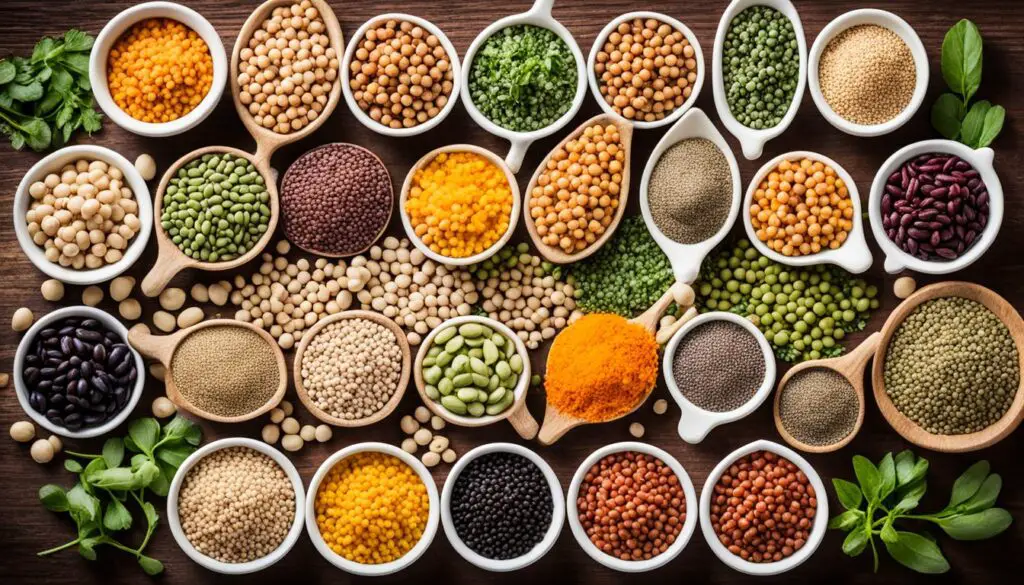
As a vegetarian on the HCG diet, it’s important to find plant-based sources of protein that can support your weight loss journey. Legumes are an excellent option, as they are not only high in protein but also rich in fiber, vitamins, and minerals. Include legumes such as lentils, kidney beans, black beans, and soybeans in your vegetarian HCG diet meals to add both protein and fiber to your plate.
Seeds can also be a valuable addition to your vegetarian HCG diet. Flax seeds, pumpkin seeds, and sesame seeds are packed with nutrients, including protein and healthy fats. Sprinkle them over salads or incorporate them into your recipes to boost your protein intake and add a satisfying crunch.
While grains are generally limited on the HCG diet, certain grains can still be enjoyed in moderation as a vegetarian. Quinoa, for example, is a complete protein that provides all nine essential amino acids. Additionally, wild rice is a nutritious option that contains both protein and fiber. These grains can be incorporated into your meals in small amounts to enhance the protein content while adhering to the HCG diet guidelines.
To summarize, legumes, seeds, and select grains can provide valuable protein sources for vegetarians on the HCG diet. By including these ingredients in your meals, you can ensure that you are meeting your protein needs while enjoying a nutritious and satisfying diet.
Conclusion
In conclusion, vegetarians can successfully follow the HCG diet by incorporating a variety of plant-based protein sources, dairy, eggs, legumes, seeds, and certain grains into their meals. By making simple substitutions and focusing on nutritious ingredients, vegetarians can enjoy delicious and satisfying meals that align with the HCG diet guidelines and support their weight loss journey.
With the wide range of vegetarian options available, such as tofu, cottage cheese, quinoa, beans, and plant-based protein powders, vegetarians can meet their protein requirements while maintaining a balanced and sustainable diet. Adding dairy and eggs can further diversify meal choices and provide additional protein sources.
Legumes, seeds, and certain grains can also contribute to a vegetarian’s protein intake while following the HCG diet. Lentils, kidney beans, flax seeds, and quinoa are examples of versatile ingredients that can be included in meals to add protein and fiber. While grains should be consumed in moderation, options like quinoa and wild rice provide valuable protein content.
Overall, with careful planning and creativity in the kitchen, vegetarians on the HCG diet can enjoy a wide array of tasty and nourishing meals. By incorporating a diverse range of plant-based protein sources and supplementary ingredients, vegetarians can successfully embark on their HCG diet journey and achieve their weight loss goals.
FAQ
Can vegetarians follow the HCG diet?
Yes, vegetarians can successfully follow the HCG diet by making simple substitutions and focusing on plant-based protein sources.
What are some vegetarian protein sources for the HCG diet?
Vegetarians on the HCG diet can include tofu, tempeh, cottage cheese, quinoa, beans, and plant-based protein powder in their meals.
Are there any meat-free HCG diet dishes?
Yes, there are plenty of meat-free HCG diet dishes that can be enjoyed by vegetarians. Some examples include vegetable stir-fry, tofu scramble, and lentil soup.
How can vegetarians ensure they are following the HCG diet guidelines?
Vegetarians can replace meat proteins with vegetarian alternatives like cottage cheese, protein powders made from plant-based sources, tofu, eggs, and soy products.
What are some tips for vegetarians on the HCG diet?
Vegetarians on the HCG diet can incorporate dairy and eggs into their meals, include legumes, seeds, and certain grains in moderation, and be creative with their meal planning.
What are some vegetarian protein replacements for the HCG diet?
Vegetarians can replace meat proteins with alternatives like cottage cheese, protein powders, tofu, eggs, and soy products like tempeh and seitan.
Can vegetarians use protein powders on the HCG diet?
Yes, vegetarians can use plant-based protein powders like rice protein powder, vegan whey powder, and sun warrior protein powder to supplement their protein intake on the HCG diet.
What are some vegetarian dairy and egg options for the HCG diet?
Vegetarians can include cottage cheese, whole eggs, egg whites, vegetarian cheese, and dairy alternatives like almond or soy milk in their vegetarian HCG diet meals.
How can vegetarians include legumes, seeds, and grains in their HCG diet?
Legumes like lentils, kidney beans, black beans, and soybeans can be included in vegetarian HCG diet meals. Seeds such as flax seeds, pumpkin seeds, and sesame seeds can also contribute to protein intake. Certain grains like quinoa and wild rice can be consumed in moderation.
Can vegetarians be successful on the HCG diet?
Yes, vegetarians can successfully follow the HCG diet by incorporating plant-based protein sources, dairy and eggs, legumes, seeds, and certain grains into their meals, supporting their weight loss journey.

